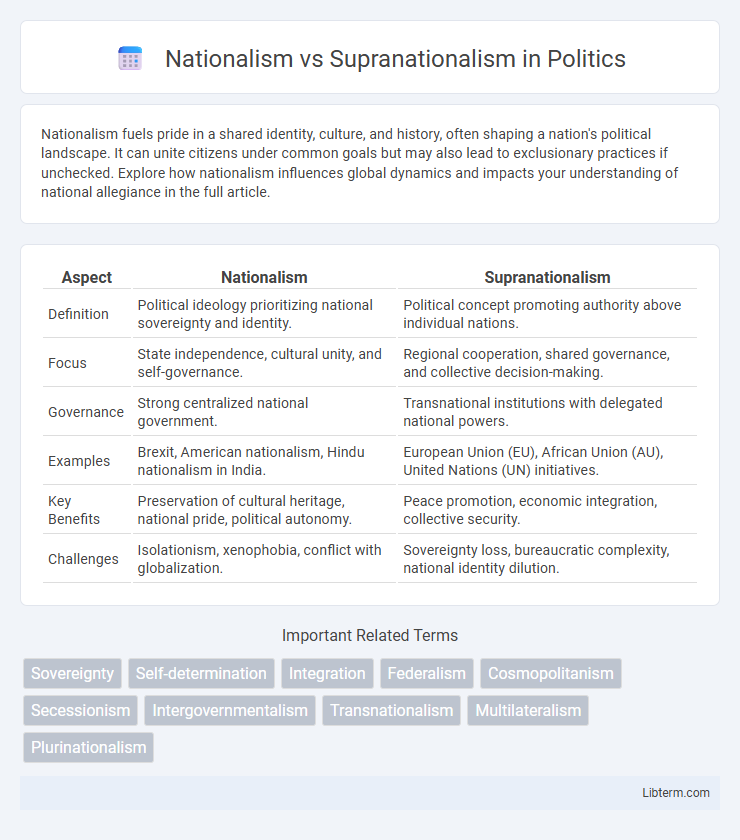Nationalism fuels pride in a shared identity, culture, and history, often shaping a nation's political landscape. It can unite citizens under common goals but may also lead to exclusionary practices if unchecked. Explore how nationalism influences global dynamics and impacts your understanding of national allegiance in the full article.
Table of Comparison
| Aspect | Nationalism | Supranationalism |
|---|---|---|
| Definition | Political ideology prioritizing national sovereignty and identity. | Political concept promoting authority above individual nations. |
| Focus | State independence, cultural unity, and self-governance. | Regional cooperation, shared governance, and collective decision-making. |
| Governance | Strong centralized national government. | Transnational institutions with delegated national powers. |
| Examples | Brexit, American nationalism, Hindu nationalism in India. | European Union (EU), African Union (AU), United Nations (UN) initiatives. |
| Key Benefits | Preservation of cultural heritage, national pride, political autonomy. | Peace promotion, economic integration, collective security. |
| Challenges | Isolationism, xenophobia, conflict with globalization. | Sovereignty loss, bureaucratic complexity, national identity dilution. |
Understanding Nationalism: Core Principles
Nationalism centers on the belief in the sovereignty and distinct identity of a nation, emphasizing cultural unity, self-determination, and political independence. It promotes loyalty to a shared heritage, language, and traditions, often prioritizing national interests over global cooperation. Key principles include the preservation of national sovereignty, the promotion of national pride, and the advocacy for governance that reflects the will of a specific nation-state.
Defining Supranationalism: Concept and Evolution
Supranationalism refers to the process where multiple nations voluntarily cede authority to an overarching organization, enabling collective decision-making beyond individual national borders. This concept evolved significantly after World War II, exemplified by institutions like the European Union, which facilitate political, economic, and legal integration among member states. The development of supranationalism addresses challenges of globalization by promoting cooperation and shared sovereignty to solve transnational issues.
Historical Context: Roots and Rise of Both Ideologies
Nationalism emerged prominently in the 19th century as a force advocating for self-determination and the formation of nation-states, deeply rooted in the Enlightenment and Romanticism movements. Supranationalism developed alongside globalization and post-World War integration efforts, exemplified by institutions like the European Union aiming to transcend national sovereignty for collective governance. The historical context of both ideologies reveals a tension between preserving national identity and pursuing broader political and economic cooperation.
National Identity vs. Collective Identity
Nationalism emphasizes the preservation and promotion of a distinct national identity rooted in shared language, culture, history, and values, often fostering loyalty and unity within a specific nation-state. Supranationalism advocates for collective identity formation that transcends individual national borders, promoting cooperation and integration among multiple states through institutions like the European Union. The tension between national identity and collective identity shapes debates on sovereignty, governance, and cultural cohesion in an increasingly interconnected world.
Political Implications: Governance and Sovereignty
Nationalism emphasizes the sovereignty and self-governance of individual states, prioritizing the protection of national identity and decision-making authority within domestic borders. Supranationalism advocates for shared governance structures that transcend national boundaries, promoting collective decision-making and often requiring member states to cede some aspects of sovereignty to centralized institutions. The political implications involve a tension between preserving autonomous state power and embracing integrated governance models aimed at addressing transnational challenges and fostering regional stability.
Economic Perspectives: Protectionism vs. Integration
Nationalism in economic policy often emphasizes protectionism, prioritizing domestic industries through tariffs, trade barriers, and subsidies to shield the national economy from foreign competition. Supranationalism, by contrast, advocates for economic integration via free trade agreements, common markets, and shared regulatory frameworks to facilitate cross-border commerce and investment. The tension between protectionism and integration defines policy debates in multinational entities like the European Union, where economic sovereignty is balanced against the benefits of a unified market.
Cultural Impacts and Social Cohesion
Nationalism emphasizes the preservation of distinct cultural identities, strengthening social cohesion within a nation through shared heritage, language, and traditions. Supranationalism promotes cultural exchange and integration across borders, fostering diversity but sometimes challenging established national social bonds. The tension between these forces shapes collective identity, influencing how communities maintain unity and adapt to globalization.
Nationalism and Supranationalism in Global Institutions
Nationalism emphasizes the sovereignty and distinct identity of individual nations, often resisting external influence from global institutions such as the United Nations or the European Union. Supranationalism advocates for pooled authority and cooperative governance among nations, granting global institutions the power to enforce policies that transcend national borders. This tension shapes international relations, as nationalist states may challenge supranational bodies' legitimacy while these institutions strive to promote collective security, economic integration, and global governance.
Case Studies: EU, Brexit, and Regional Alliances
The European Union exemplifies supranationalism by promoting integration and collective governance across member states, balancing national sovereignty with shared policies on trade, immigration, and security. Brexit represents a resurgence of nationalism, where the United Kingdom prioritized national sovereignty and control over laws and borders, rejecting further EU integration. Regional alliances like ASEAN and Mercosur reflect varying degrees of supranational cooperation, emphasizing economic collaboration while navigating the tension between member states' national interests and collective regional goals.
Future Trends: Balancing National and Global Interests
Future trends in nationalism versus supranationalism emphasize the intricate balance between preserving national sovereignty and addressing global challenges through cooperative frameworks like the United Nations and European Union. Rising geopolitical tensions and climate change demand innovative policies that integrate national priorities with supranational goals to foster sustainable development and security. Technological advancements in communication and data sharing enhance the capacity for collaborative governance, promoting a hybrid model that respects cultural identities while pursuing collective interests.
Nationalism Infographic

 libterm.com
libterm.com